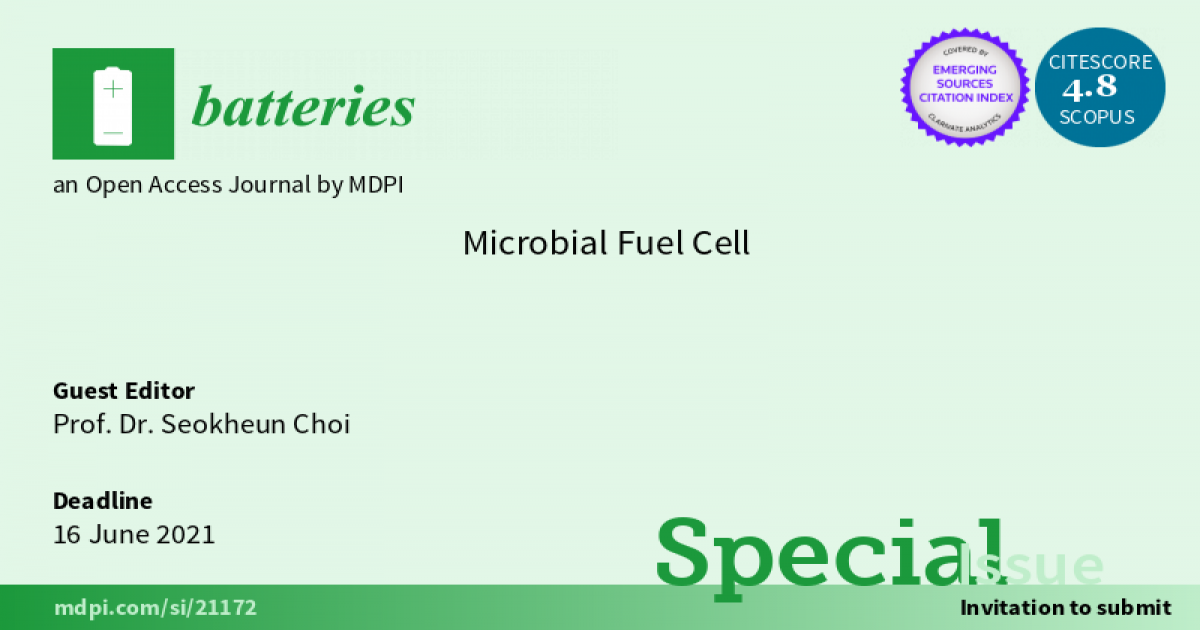Microbial Fuel Cell
A special issue of Batteries (ISSN 2313-0105).
Deadline for manuscript submissions: closed (28 February 2022) | Viewed by 1703

Special Issue Editor
Interests: bioelectronics and microsystems; bioMEMS/NEMS; microfluidics; semiconductors; biosensors and biofuel cells; bioenergy; nanotechnology
Special Issues, Collections and Topics in MDPI journals
Special Issue Information
Dear Colleagues,
The next generation of sustainable energy could come from microorganisms; evidence of this has given rise to electromicrobiology, the study of microorganisms’ electrical properties. Many recent advances in electromicrobiology stem from studying microbial fuel cells (MFCs), which are gaining acceptance as a future alternative "green" energy technology and energy-efficient wastewater treatment methods. MFCs are powered by live microorganisms with clean and sustainable features; they efficiently catalyze degradation for a broad range of organic substrates under natural conditions. Despite their vast potential, our ability to harness the potential of MFC technology lags from a lack of in-depth understanding of the mechanisms that achieve electron harvesting from microorganisms, and fundamental factors that maximize MFCs’ power-generating capabilities. These gaps relegate MFCs to a laboratory curiosity.
In this Special Issue, we welcome review articles and original research papers that address key issues related to MFC technologies, including basic research, materials development, device architectures, system integration, and power management, in the framework of emerging and demanding biotechnological applications.
Prof. Dr. Seokheun Choi
Guest Editor
Manuscript Submission Information
Manuscripts should be submitted online at www.mdpi.com by registering and logging in to this website. Once you are registered, click here to go to the submission form. Manuscripts can be submitted until the deadline. All submissions that pass pre-check are peer-reviewed. Accepted papers will be published continuously in the journal (as soon as accepted) and will be listed together on the special issue website. Research articles, review articles as well as short communications are invited. For planned papers, a title and short abstract (about 100 words) can be sent to the Editorial Office for announcement on this website.
Submitted manuscripts should not have been published previously, nor be under consideration for publication elsewhere (except conference proceedings papers). All manuscripts are thoroughly refereed through a single-blind peer-review process. A guide for authors and other relevant information for submission of manuscripts is available on the Instructions for Authors page. Batteries is an international peer-reviewed open access monthly journal published by MDPI.
Please visit the Instructions for Authors page before submitting a manuscript. The Article Processing Charge (APC) for publication in this open access journal is 2700 CHF (Swiss Francs). Submitted papers should be well formatted and use good English. Authors may use MDPI's English editing service prior to publication or during author revisions.
Keywords
- microbial fuel cells
- bioelectrochemical systems
- electromicrobiology
- microbial electrogenicity
- sustainable wastewater treatment
- bioelectricity generation
- new materials and structures for microbial fuel cells
- new methods and technologies for high power generation
- power management
- microbial fuel cell stacks
Benefits of Publishing in a Special Issue
- Ease of navigation: Grouping papers by topic helps scholars navigate broad scope journals more efficiently.
- Greater discoverability: Special Issues support the reach and impact of scientific research. Articles in Special Issues are more discoverable and cited more frequently.
- Expansion of research network: Special Issues facilitate connections among authors, fostering scientific collaborations.
- External promotion: Articles in Special Issues are often promoted through the journal's social media, increasing their visibility.
- Reprint: MDPI Books provides the opportunity to republish successful Special Issues in book format, both online and in print.
Further information on MDPI's Special Issue policies can be found here.





